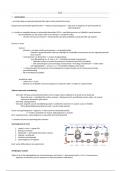Tentamen (uitwerkingen)
COMD 5070 Final Exam Questions and Answers Solved
- Vak
- Instelling
neither invariant nor linear -ANSWER- The speech signal is perceptual normalization -ANSWER- When a listener simplifies the processing of the speech signal to smooth out superfluous variability, it is called categorical perception -ANSWER- One type of quantal perception that occurs as we list...
[Meer zien]




